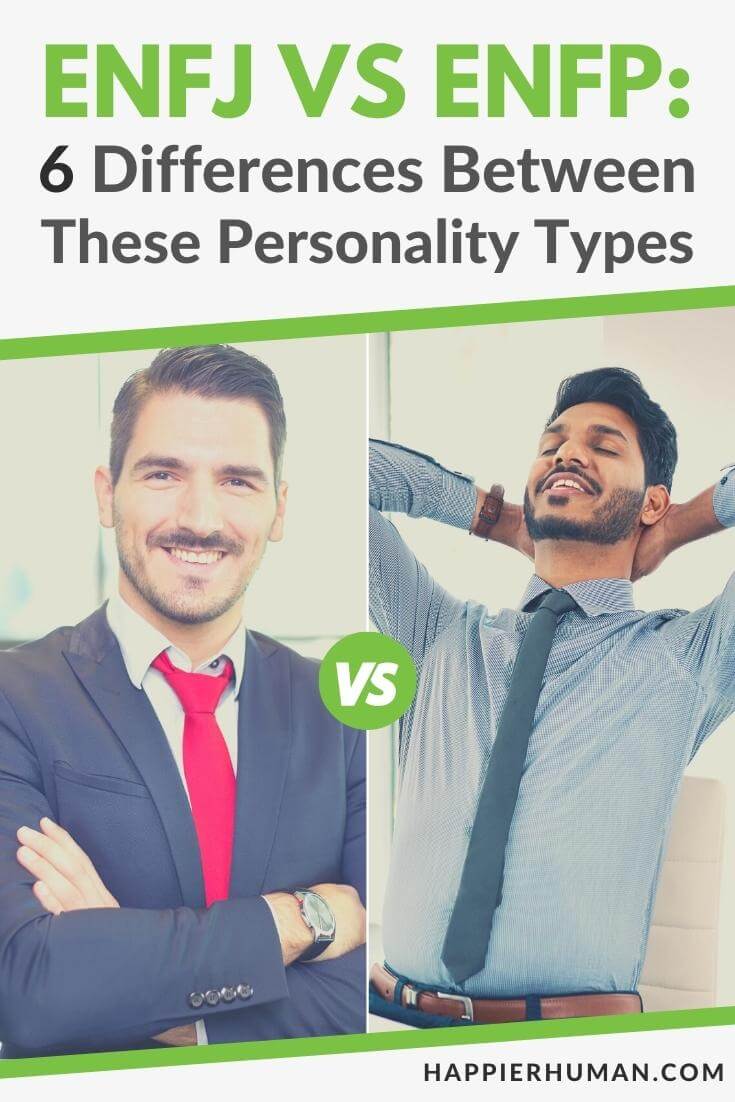In the US, the ENFP personality type is much more common than the ENFJ. And while these two personalities share much in common and have many similar characteristics, they often behave very differently.
The key position of the fourth preference type plays a huge role in how people act and present themselves to others, magnifying the differences between ENFJ and ENFP personalities. Let’s learn more about ENFJ vs. ENFP personality types.
What Is the ENFJ Personality Type?
The ENFJ personality is known as the Protagonist, a personality motivated by an idealistic vision to help others and achieve a greater purpose in life. The key attributes of an ENFJ are:
Extroverted
The first preference indicates where a person tends to direct and receive their energy. Extroverts prefer to direct their energy outward toward people, activities, and sensations in the external world. Extroverts are energized by activity and interactions with others. Extroverts discover their ideas and beliefs through their behaviors and sometimes act without planning.
InTuiting
The second psychological preference indicates the way a person prefers to receive information. An intuiting person pays more attention to information patterns, impressions, and underlying meaning.
They learn by thinking things through and exploring the implications of new information. They mentally explore symbols, theories, and abstractions and remember ideas and concepts better than factual details.
Feeling
The third preference indicates the way a person prefers to make decisions. A feeling person makes decisions by considering the perspectives and opinions of everyone involved and trying to create a harmonious outcome.
They want to deeply understand the feelings of the people around them and reach a peaceful resolution, and they know that no two different situations will have the same solution because other people and different feelings will be involved.
Judging
The final preference indicator refers to how a person deals with the outside world. For example, a person with a judging personality prefers a structured life, concrete plans, and firm decisions. They make step-by-step plans, keep to-do lists and schedules, and exercise control over their lives and time.
The Protagonist is a born leader with a passion and charisma that attracts the attention and affection of others. They are vocal about defending their values but act with warmth and sensitivity that wins friends rather than starts fights. They are persuasive, inspiring, and authentic.
The ENFJ can make friends and bridge gaps between all personality types, and they are loyal and devoted friends. Their ability to plan and follow through makes them even more powerful leaders, and ENFJs make excellent teachers, coaches, and community organizers.
What Is the ENFP Personality Type?
The ENFP personality is called the Campaigner. They are motivated by big ideas and ideals, filled with hope and optimism for the future. The ENFP preferences are:
Extroverted
The first preference indicates where a person tends to direct and receive their energy. Extroverts prefer to direct their energy outward toward people, activities, and sensations in the external world. Extroverts are energized by activity and interactions with others. Extroverts discover their ideas and beliefs through their behaviors and sometimes act without planning.
InTuiting
The second psychological preference indicates the way a person prefers to receive information. An intuiting person pays more attention to information patterns, impressions, and underlying meaning.

They learn by thinking things through and exploring the implications of new information. They mentally explore symbols, theories, and abstractions and remember ideas and concepts better than factual details.
Feeling
The third preference indicates the way a person prefers to make decisions. A feeling person makes decisions by considering the perspectives and opinions of everyone involved and trying to create a harmonious outcome.
They want to deeply understand the feelings of the people around them and reach a peaceful resolution. They know that no two different situations will have the same solution because other people and different feelings will be involved.
Perceiving
The final preference indicator refers to how a person deals with the outside world. A perceiving person prefers to remain flexible and spontaneous, allowing events to unfold around them. They want to understand, adapt, and interact with the world rather than structure and control it. Therefore, they are casual about their activities, keep planning to a minimum, and keep their options open.
A Campaigner is outgoing, optimistic, and energetic, eager to have a good time and work toward a greater purpose and impact on the world. They are imaginative, curious, enthusiastic, and charismatic. They are also independent and willing to take risks, often innovators in their chosen field.
The ENTPs great people skills and big goals make them inspiring leaders. Still, their creativity and flexibility sometimes distract them from new ideas and inspiration, and they struggle to follow through on plans and ideas.
What Do ENFJ and ENFP Personalities Have in Common?
The ENFJ and ENFP personalities have quite a lot in common. Here are the most significant similarities between ENFJ and ENFP personalities:
1. Communication Skills
ENFJ and ENFP personality types have excellent people skills and are natural communicators. They are warm and friendly but also genuinely interested in the happiness of others. In addition, they are sensitive listeners, inspiring leaders, caring friends, and engaging co-workers.
2. Big Dreams
The tendency for ENFJ and ENFP personalities to care so much about others, and have such big dreams and ideals, draws many of these personalities into politics or public service. They are idealists who want to improve the world, and their imagination knows no limits. These people imagine the world as it might be and then work to make it happen.
3. People-Pleasing
The ENFJ and ENFP personalities both care a lot about the feelings, opinions, and well-being of others and want to be liked and respected. Unfortunately, this can lead both personality types to become people-pleasers, undermining their self-confidence and ability to set healthy boundaries.
Considering the personalities of famous ENFJs like Alexandria Ocasio-Cortez, and famous ENFPs like Barak Obama, the similarities become even more evident.
6 Key Differences Between ENFJ and ENFP Personalities
While it makes sense that these personality types share many things in common and are very similar, their differences are striking. Here are the critical differences between ENFJ and ENFP personalities.
1. Personality Frequency
ENFJ: 2-5% overall. ENFP: 6-8% overall
The ENFJ personality is less common among American adults, but both personality types are more common among women. In fact, 8-10% of American women are ENFP personality types, making it likely that there is an important female ENFP in your life.
2. Reliable vs. Unreliable
Reliable: ENFJ. The ability of an ENFJ to create order and structure, follow through on their plans and intentions, and keep schedules and to-do lists, makes them much more reliable than the spontaneous ENFP.
Unreliable: ENFP. An ENFP is easily distracted by new ideas and information and prefers to keep their time unscheduled and their options open, making them less reliable about their commitments.
3. Structured vs. Unfocused
Structured: ENFJ. The structured ENFJ likes to make plans and lists and prefers to work first and relax later. This can make them highly reliable and can also make them lean toward being controlling of processes and activities.
Unfocused: ENFP. The more flexible ENFP adapts easily to a change of plans and doesn’t feel a need to control schedules and activities. In fact, they are more prone to change plans mid-stream, get bored or distracted, or want to try something new. Unfortunately, their natural flexibility can quickly become a lack of commitment and focus.
4. Intense vs. Easy-Going
Intense: ENFJ. An ENFJ personality type can be so determined to accomplish their goals, stick to their lists, and get things done that they can sometimes become pretty intense. This intensity is an excellent characteristic of a leader, where it helps create enthusiasm and commitment, among others.
Easy-going: ENFP. The more relaxed ENFP isn’t as intense and is more easy-going. Their optimism leads them to believe that things will work out well and don’t require as much effort to achieve. In addition, their natural flexibility and willingness to go with the flow make them less intense.
5. Overbearing vs. Enthusiastic
Overbearing: ENFJ. The ENFJ is not always overbearing and isn’t a core characteristic of the type. However, their sincere desire to be helpful, supportive, and work for the success of others can sometimes be overbearing and overprotective.
In addition, their natural desire to make structures and lists, and processes can feel stifling to more relaxed personality types, and they can overstep boundaries.

Enthusiastic: ENFP. While the ENFP is just as committed to the success and well-being of others, it tends to take the form of supportive enthusiasm and cheerleading.
This enthusiasm and genuine support are friendly and comforting but often not backed up by concrete plans and action to help out since plans are the ENFP’s weak spot.
6. Self-Sacrificing vs. Overthinking
Self-sacrificing: ENFJ. The extreme competence and capability of the ENFJ, with their tendency to be a bit overbearing, can lead them to neglect self-care and sacrifice too much of themselves.
They often feel they could make the world a better place, fix the lives of friends and loved ones, or turn around a business endeavor if they just worked more and harder. Instead, their affection, loyalty, and commitment can make them push themselves too hard and give too much.
Overthinking: ENFP. When faced with problems in the world, workplace, or relationships, the warm and sensitive ENFP often responds by withdrawal rather than action. An ENFP is prone to being over-sensitive and over-thinking, dwelling in their negative thoughts and emotions and making them worse.
Rather than ask questions and seek resolution, they avoid confrontation and difficult decisions, which can lead to unhappiness.
As you can see, the most prominent theme in the differences between ENFJ and ENFP personalities is that the ENFJ is organized and reliable, which can lead to them excessively managing the lives and emotions of others.
On the other hand, the more relaxed and easy-going ENFP is also less reliable, prone to getting distracted, losing focus, and not following through on commitments.
Final Thoughts on the ENFJ and ENFP Personalities
Both ENFJ and ENFP personalities are active, energetic, optimistic, and passionate, driven by values and the desire to have a positive impact on the lives of others. They are compassionate, sensitive, and helpful, which makes them wonderful friends and partners.
Under stress, these personalities express their tendencies and weaknesses differently and have different challenges to overcome.
However, it is essential to remember that the Meyers-Briggs Type Indicator, along with other personality type assessments, does not describe a person's capabilities. These tests capture personality habits and preferences rather than abilities, and many preferences are stronger or weaker in different people.
For example, many perceiving types are capable of keeping lists and schedules, and many introverts can enjoy socializing with strangers; it is simply a question of preference and degree.
Learning more about the MBTI helps you understand the behaviors and aptitudes of the people in your life, which can improve communication and cooperation in various ways. But, more importantly, it helps you better understand yourself, so you can make choices that help you be successful.
Finally, if you want to identify YOUR personality type, then take one of these 11 personality tests to better understand what makes you tick.


